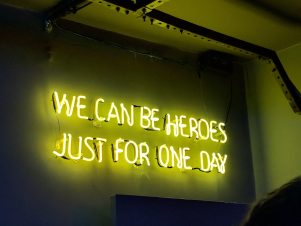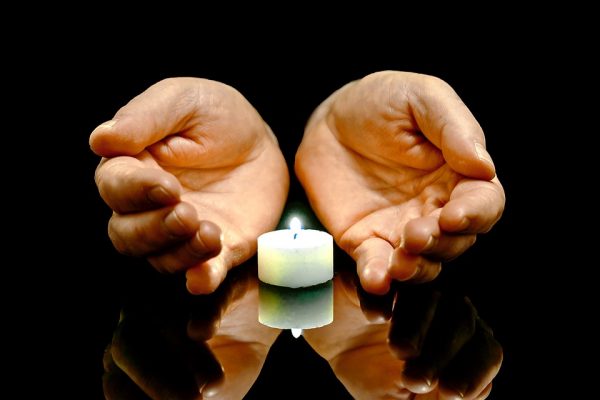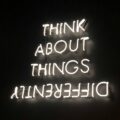Courage to Be A Daily Hero
Article By Vasant Sanzgiri & Samarth Shetty
 The word ‘hero’ comes from an ancient Greek root, which literally translates to ‘protector’ or ‘defender’. Dictionary.com defines the word as “a person noted for courageous acts or nobility of character”, and popular perception recognizes a hero as one who performs deeds that are not commonly possible, or one who exhibits virtues or values that makes them stand out. So, we usually think of superheroes celebrated in movies, or victorious warriors like General Patton and Napoleon. Fernando Schwarz, in his book Perseus: The Warrior of Peace, talks of a potential hero who is “someone who seizes a destiny, not a destiny that others impress upon us, but his own destiny… but it is also to have the courage to implement that vision every day.” (1) How might we draw inspiration from archetypical characters from mythology and history? What are some of the challenges we are likely to encounter? Can we too be heroes?
The word ‘hero’ comes from an ancient Greek root, which literally translates to ‘protector’ or ‘defender’. Dictionary.com defines the word as “a person noted for courageous acts or nobility of character”, and popular perception recognizes a hero as one who performs deeds that are not commonly possible, or one who exhibits virtues or values that makes them stand out. So, we usually think of superheroes celebrated in movies, or victorious warriors like General Patton and Napoleon. Fernando Schwarz, in his book Perseus: The Warrior of Peace, talks of a potential hero who is “someone who seizes a destiny, not a destiny that others impress upon us, but his own destiny… but it is also to have the courage to implement that vision every day.” (1) How might we draw inspiration from archetypical characters from mythology and history? What are some of the challenges we are likely to encounter? Can we too be heroes?
In The Everyday Hero, Delia Steinberg Guzman writes that being a Hero is to hold onto a “heroic sense of life” and is not just “a single act of heroism”. The heroic sense of life, she speaks about is “like a general direction; it is a path which, passing through difficult terrain, leads to a goal. Heroism then consists in seeing each day, each act, as a test or trial in which all our strengths – from physical strength to the subtle powers of intelligence and the soul – are going to come into play.” (2) Hence, the 2 important elements are first, having a goal, and second, seeing a path that leads to that goal. The challenges on the path that we face every day can be our source of inspiration. They allow us to discover and develop the qualities which we perhaps already inherently possess, to surmount obstacles and navigate through troubled waters successfully, emerging like true heroes, victorious.
To be able to fight our daily battles requires us to call upon our inner strength, supplemented with some abilities that equip us to overcome challenges. These include the conviction in what we do with the humility to accept the outcome, whatever it may be. Beyond just good intentions, we need to act with consciousness and intelligence, and exercise an unswerving will to remain steadfast in the face of our day to day challenges.
In our quest to unravel how to become heroes, we took inspiration from the daring and tenacity of those who seem to have endeavoured to channelize the above qualities. Some of them are celebrated for their outstanding, noble and ground-breaking conduct, while some of them though lesser known, have in our experience abundantly displayed the tenets of an authentic everyday hero, in thought, demeanour and action. Our investigation uncovered 5 approaches to overcome some common challenges we encounter almost every day.
Stand for Truth
The post-truth world creates external circumstances that cause us to be swayed by opinions, assumptions and speculations. It is far more convenient to surrender to herd mentality than to step up and be the lone voice of Truth. Not only must we develop the courage to stand for truth, we must also ensure that we are prepared to face the consequences of our stand in a world in which social media can shred reputations in an instant. Only a strong conviction in the pursuit of Truth, a well-defined goal, and an unrelenting determination can give us the inner strength to remain resilient. As Gandhiji said, “Strength does not come from physical capacity, it comes from indomitable will.” (3)
Fight Fear
Fear arises from our preoccupation with consequences. It is natural that we will encounter fear as it is a natural defence mechanism inbuilt in our biology to safeguard survival. But the challenge is to resist the temptation to escape, to embrace the fear, to work with it by facing it and responding to it objectively. Then perhaps, the fear, rather than a prison, can become a ladder to help go beyond our limitations to encounter the unknown. In a passage from the book Rules for a Knight, the author Ethan Hawke says, “Fear is nothing to be ashamed of, it is a powerful resource, reminding us to be wary, alert and mindful. Fear is dark and courage is the light. Fear is the call and courage is the answer. When struggling to find his courage, a knight relies on his breath. Sword fighting, archery, horsemanship – virtually every task I can think of is aided by an awareness of breath. By focusing on our breath, we can more adeptly inhabit our bodies and function on instinct.” (4)
Forgiveness and Compassion
Reacting to perceived hurt with anger, ego, and vengeance, will always result in alienation, conflict and violence. Is it possible to begin to see an adversary as a person, a human being, also caught within a set of circumstances and resources, not always in his control? Can we develop the empathy to hold on to our own humanity? Nelson Mandela said, “Our human compassion binds us to one another … as human beings, who have learnt how to turn our common suffering into hope for the future”. (5) On the other hand to forgive and show compassion does not mean to yield and surrender. Sometimes compassion is expressed as a just battle. “Compassion and tolerance are not a sign of weakness, but a sign of strength,” says HH Dalai Lama. (6)
Facing the Tests of Life
In the book Rules for a Knight, author Ethan Hawke says, “Anything that gives light must endure burning.” To cut and polish a diamond to perfection requires a lot of friction. So, dealing courageously with the challenges that life throws at us, contributes to our growth, whether we fail or succeed. In moments of defeat, Hawke advises us to “let those feelings pass over and through you. Like a dead branch falling from a tree, which then decomposes and nourishes the soil, your disappointments can transform into the element of change and growth.” (4) The joy of victory can make a person resting on his laurels, complacent and blind to imminent danger lurking round the corner. We must recognise, how we deal with both victory as well as defeat, have lessons embedded within.
Dream
The courage to dream and then to make those dreams into reality calls for the ability to imagine; to dare to aspire for what is as yet invisible, lying latent within our potential. Yet without the tremendous inner work of discernment and discipline, dreams are reduced to mere fantasies; idle talk, building castles in the air, with no connect to reality. A trainee fighter pilot can dream of flying a jet and manoeuvre it to the best of his abilities, but if he thinks of manoeuvring a passenger plane like a fighter jet, then it becomes a fantasy, a total waste of energy and time. Pursuing the dream with courage, not deterred by external challenges and fulfilling it without deviation, is to slowly make those aspirations tangible. Marcus Aurelius said, “Nothing happens to any man that he is not formed by nature to bear.” (7) To me then, it follows that that we always have the capacity, both to dream, and fulfil our dreams. Dreams, and not fantasies, take us closer to our goals, on the path towards actualization.
Hence, the challenges we face on our way are perhaps an opportunity to call upon our resilience. Demanding conditions give us an opportunity to test our ability to keep our centre, without compromising the practice of virtues. In this, we may fall, but failures can propel us to rise and move forward. And challenging times shall pass, to be replaced with newer challenges, for as Swami Vivekananda said, “In a day when you don’t come across any problems, you can be sure that you are travelling on a wrong path.” (8)
Says Delia Steinberg Guzman, “Maybe you don’t yet feel the hero in yourself? Make space for him and you will see him grow like an inner column…This is an invitation to be different, to be better, to be clear, honest and reasonable in the name of natural philosophy, when everyone seems determined to harm themselves for the sake of pretentiousness and ignorance.” (2) It is vital to never lose hope, never lose our centre, never lose the connection with the hero that resides within us.
Image Credits: By Gabriel Bassino | Unsplash | CC BY PD
The entity posting this article assumes the responsibility that images used in this article have the requisite permissionsImage References
By Gabriel Bassino | Unsplash | CC BY PD
Permissions required for the publishing of this article have been obtained
Article References
Bibliography 1. Schwarz, Fernando. Perseus: The Warrior of Peace. New Acropolis Cultural Organization. (2018). 2. Guzman, Delia Steinberg. The Everyday Hero. New Acropolis Cultural Organization. (2018). 3. Top 20 inspiring Mahatma Gandhi quotes




What do you think?